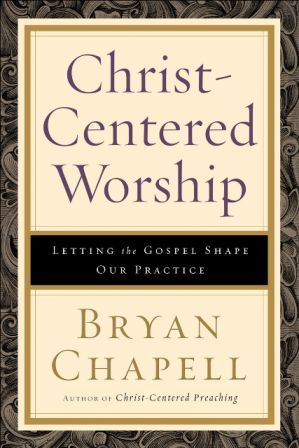
The frequency and intensity of conflicts over worship wear us down and threaten to steal our joy. When men attempt to write on the subject, often their works carry a sharp polemic edge which is quickly dulled by the perceived need of addressing the controversies which swirl about.
Bryan Chapell is the president of Covenant Theological Seminary in St. Louis, Missouri whose book Christ-Centered Worship avoids those pitfalls. He pushes hard to get to the heart of what worship is all about, and then from that vantage point begins to address secondary matters as their priority demands. This is a very important and a very wise book.
Some readers will be too quickly put off with the ‘textbookish’ feel of the early chapters. That would be a mistake. His argument needs careful attention.
He first walks us through an evaluation of the history of Christian worship. He does so to show that cutting across generations, denominations, and theologies, Christian worship has always been structured around a re-presenting of the gospel. God is revealed and praised; his people humbled, confess, and receive assurance; a redeemed people are instructed in his word and fed on his grace; and they are dismissed into the world refreshed and renewed in the gospel.
Worship has maintained its commonality throughout history because it is responding in every context to the same gospel. The heart of Dr. Chapell’s argument is then to show that this gospel is the biblical theme behind all worship in the whole Bible. Those who scan the Bible for precise liturgical forms err. What the Bible reveals is a gospel orientation to God which dictates every response to him. The gospel is the heart of worship.
If we are persuaded that it is the gospel that guides our liturgical construction, it is simply, then, another step for us to begin to face the difficult cultural and stylistic questions with the same gospel-centered thinking. Though Dr. Chapell’s position on certain issues is not disguised, what matters to him is that we begin to ask ourselves ‘gospel’ type questions in evaluating issues, and not simply questions of preference.
His approach cuts a sharp path to the heart of many questions. His challenge should shake us all up, no matter where in the discussions we find ourselves. Years of arguing can tend to polarize even the best of men. Chapell’s gospel-centered methodology should draw us all back to the table with repentance and humility.
Bryan Chapell is not only “an ‘ell of a chap” (sorry – that is the only way I’ve been able to remember how to spell his hame) but he is an imminently wise writer.
I long for the day when the polemics of worship will cease, when writers empty the vitriol from their pens and speakers lose the sarcasm in their speech and we can center our discussions of worship on the degree to which the gospel is re-presented, grasped, and understood. This book is a huge step in that direction.
